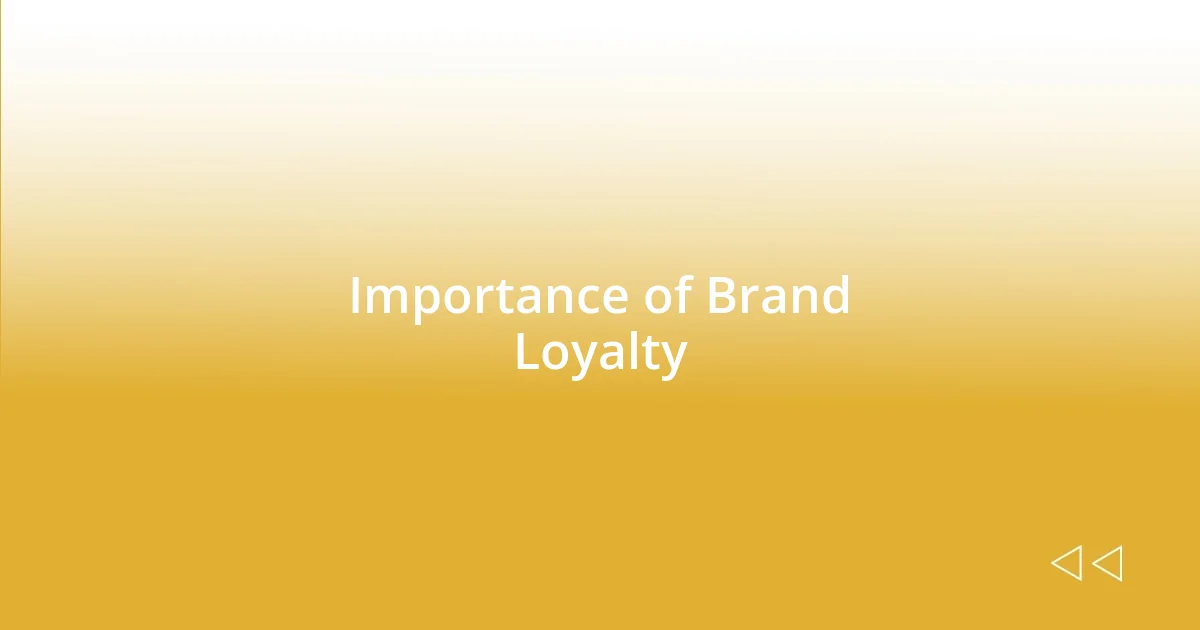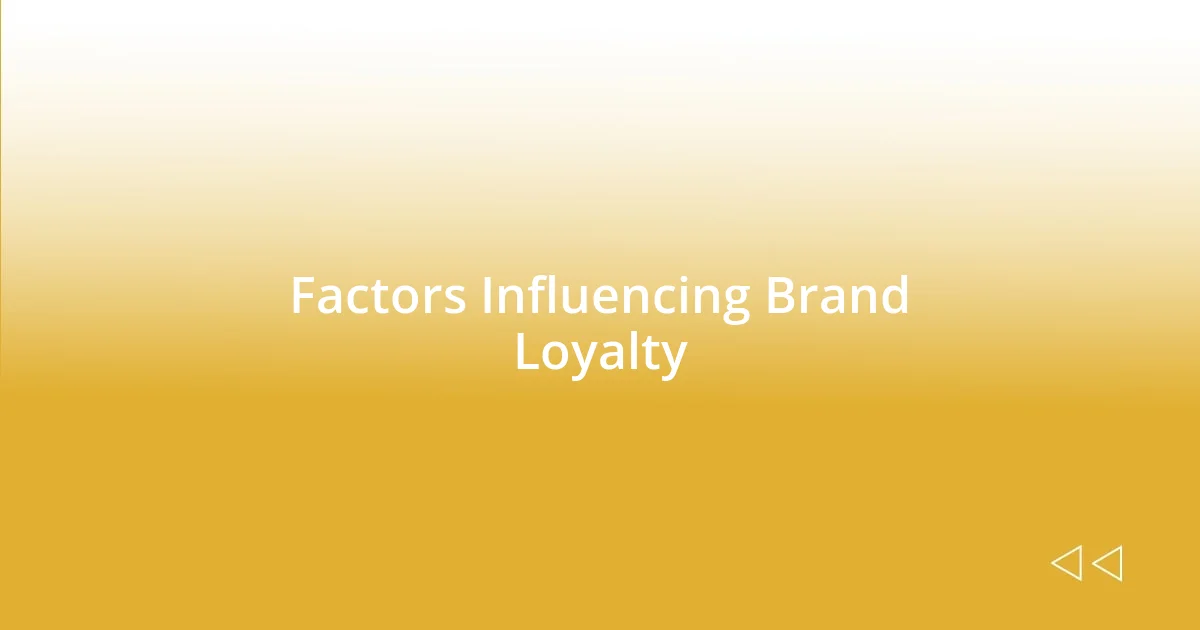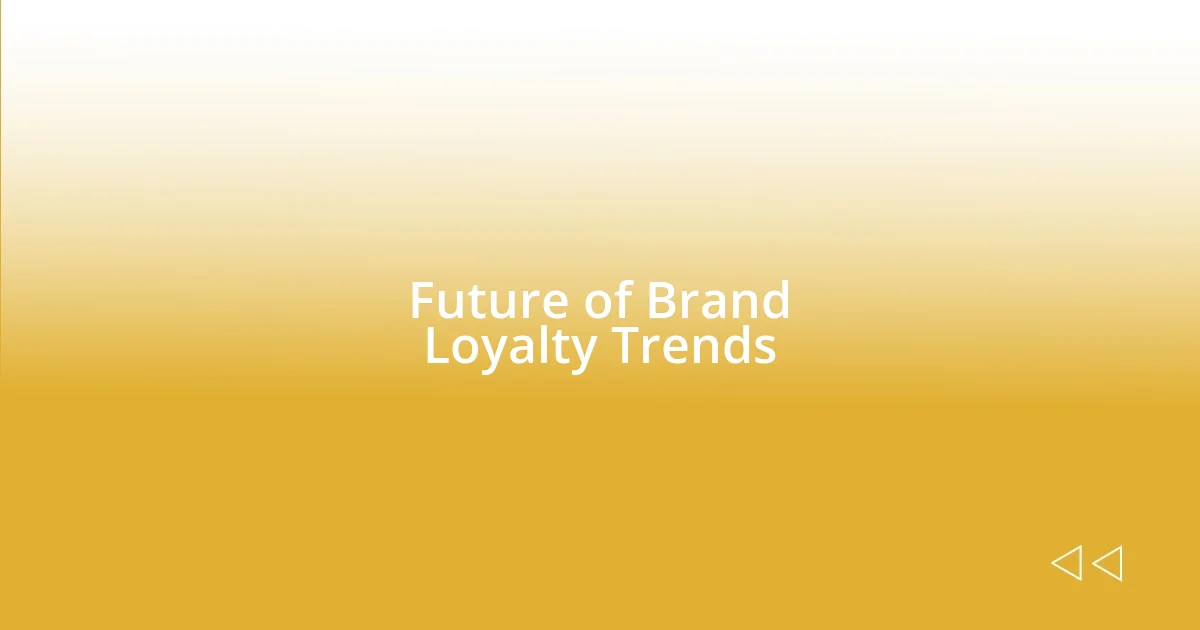Key takeaways:
- Brand loyalty is defined as the emotional connection between consumers and brands, fostering repeat purchases through trust and shared values.
- Personalization, social responsibility, and community engagement are key trends driving brand loyalty, as consumers increasingly seek brands that resonate with their values and experiences.
- Measuring brand loyalty effectiveness requires analyzing customer behaviors, including Net Promoter Score and retention rates, to understand both emotional and transactional loyalty metrics.

What is Brand Loyalty
Brand loyalty is the emotional connection between a consumer and a brand, leading to repeat purchases over time. It’s not just about choosing the same products; it’s about feeling a sense of belonging. For instance, I remember when I first discovered a particular coffee brand—it almost felt like a friend instead of just a beverage. Have you ever felt that connection to a brand that made you go back, time and again?
This loyalty often stems from positive experiences, trust in the brand’s promises, and shared values. If a company stands by its commitments, it instills a sense of confidence. I’ve always appreciated brands that not only deliver quality but also show care for social issues. Doesn’t it make you want to support them even more?
At its core, brand loyalty is also a defense mechanism against the overwhelming choices we face today. We’re bombarded with options, so falling back on a trusted brand is comforting. Think about the last time you were overwhelmed in a store—didn’t you find yourself gravitating toward a familiar label? That instinct reveals a deeper relationship than mere consumerism.

Importance of Brand Loyalty
Loyalty to a brand doesn’t just benefit the consumer; it’s crucial for businesses too. I’ve watched how some brands become community staples simply because they stay true to their values. Remember a brand that supports local initiatives or environmental causes? When I see that commitment, it strengthens my connection to them, making it hard for me to switch to alternatives.
The long-term relationship birthed from brand loyalty can lead to a more sustainable customer base. I’ve noticed that customers who are loyal tend to spread the word, acting as brand ambassadors. With my previous experience in retail, I saw how a steady group of loyal customers not only returned for their favorite products but also encouraged newcomers, creating a vibrant community around the brand. How powerful is that?
Moreover, cultivating brand loyalty can significantly reduce marketing costs. When I choose a brand I trust, I rarely need to be courted with ads or promotions. It’s like having a trusty friend. This relationship means brands can save resources while ensuring a steady revenue stream just from their loyal fans. It’s a win-win situation, wouldn’t you agree?
| Aspect | Importance of Brand Loyalty |
|---|---|
| Emotional Connection | Encourages repeat purchases and cultivates a sense of belonging. |
| Trust and Reliability | Brands that meet promises strengthen consumer confidence. |
| Community Building | Loyal customers often promote the brand, bringing in new consumers. |
| Cost Efficiency | Loyalty reduces marketing costs by diminishing the need for aggressive promotion. |

Current Trends in Brand Loyalty
As I’ve observed lately, one noteworthy trend in brand loyalty is the increasing emphasis on personalized experiences. Brands are really tapping into data to understand consumers better, and I find it fascinating how this level of customization can create stronger bonds. Last month, I received a unique offer from a skincare brand based on my previous purchases, and it made me feel valued and understood. It wasn’t just a generic discount; it felt like they truly recognized my needs.
Here are some current trends shaping brand loyalty:
- Personalization: Tailored experiences resonate well with consumers, fostering a deeper connection.
- Health and Sustainability: Brands that prioritize eco-friendly practices or health-conscious products are earning fierce loyalty.
- Social Responsibility: Companies actively involved in social causes are drawing consumers who share similar values.
- Experience Over Product: Brands that focus on delivering memorable experiences rather than just products are gaining a loyal following.
Another trend that’s hard to miss is the growing importance of community engagement. I’ve come to appreciate brands that build communities around shared interests and values. Recently, I participated in a virtual event organized by a footwear brand that emphasized sustainability. Not only did I learn something new, but I also felt part of a larger movement. It’s that sense of belonging that keeps me returning and sharing my enthusiasm with others.
- Community Building: Engaging consumers by creating platforms for interaction enhances loyalty.
- Transparency: Honest communication about business practices builds trust and encourages loyalty.
- Omnichannel Strategies: Seamless experiences across various platforms cater to the consumer’s preference for convenience.
- Influencer Partnerships: Brands collaborating with influencers who reflect their values are effectively tapping into new customer bases.

Factors Influencing Brand Loyalty
One significant factor influencing brand loyalty is the emotional connection consumers have with a brand. I remember my first experience with a coffee shop that made my morning routine feel like a warm hug. The barista knew my name and preference, making me feel valued each time I walked in. This kind of personal touch is powerful; it makes you think—don’t we all crave that special recognition? It creates a bond that keeps customers coming back, often for years.
Another aspect that really stands out is trust and reliability. I can’t help but recall a tech company that consistently met my expectations. They communicated transparently during product launches, addressing any potential hiccups upfront. I felt confident purchasing their latest gadget because I had seen their commitment to quality over time. This trust isn’t built overnight; it develops through consistent performance, and once established, it becomes a cornerstone of loyalty.
Lastly, the sense of community built around a brand cannot be underestimated. I recently attended a local event hosted by a clothing brand whose values resonate with my own. The atmosphere was electric; everyone was genuinely excited. These gatherings foster connections not just between the brand and consumers but among consumers themselves. Have you ever felt that thrill of belonging to something bigger? That’s what brand loyalty can achieve—making people feel like they’re part of a shared journey.

Building Brand Loyalty Strategies
Building effective brand loyalty strategies requires a deep understanding of what resonates with consumers. For instance, I recall a time when I signed up for a coffee subscription service. Each month, they didn’t just send the same blend; they introduced me to different flavors from around the world along with stories behind them. I felt like I was embarking on a flavor journey, and that personalized touch made me excited to renew my subscription—not just for the coffee, but for the experience.
Equally important is the role of social proof and authentic storytelling. I still remember a skincare brand that highlighted user-generated content on their social media. They showcased real customers sharing their journeys with the products. Seeing someone like me share their success made me trust the brand more. It’s a simple yet powerful question: don’t we all want to feel part of a community where our stories are valued?
Lastly, consider the impact of loyalty programs that prioritize customer engagement. A sportswear brand I frequently shopped at introduced a points system, but they innovated beyond just discounts. They rewarded me for participating in fitness challenges and sharing my progress. The feeling of achievement was amplified when I could redeem points for gear that supported my active lifestyle. Can you imagine the motivation that creates? Customers aren’t just buying a product; they’re investing in their identity, which is where true loyalty lies.

Measuring Brand Loyalty Effectiveness
Measuring brand loyalty effectiveness isn’t just about observing sales patterns; it requires digging deeper into customer behaviors and sentiments. I remember analyzing customer feedback for a favorite brand of hiking gear I loved. They collected survey responses regarding product satisfaction and made it accessible; seeing how they took that feedback to heart gave me confidence in their commitment to improvement. Isn’t it fascinating how a simple survey can impact a customer’s perception so significantly?
Another poignant method I’ve encountered is through Net Promoter Score (NPS). This metric indicates how likely customers are to recommend a brand to others, revealing their overall satisfaction. I recall a time when my go-to online clothing store sent me an NPS survey after my purchase. The idea that my opinion could shape their services felt empowering. Isn’t this kind of measurement a reflection of a brand’s respect for its community?
Lastly, there’s value in analyzing customer retention rates alongside repeat purchase behaviors. I often think back to a beverage brand that captivated me with a limited edition flavor. Despite that flavor’s brief availability, I found myself repeatedly purchasing their other options afterward. It made me wonder how a fleeting experience could cultivate ongoing loyalty—funny how a single tasty moment can lead to a lasting commitment, right? It goes to show that effective measurement truly encompasses both emotional and transactional markers.

Future of Brand Loyalty Trends
The future of brand loyalty trends is increasingly leaning towards personalized experiences. I recall a subscription box service I tried that went above and beyond by curating items based on my preferences. It felt as if they truly understood my tastes. Isn’t it incredible when a brand makes you feel like you’re their only customer? That level of personalization not only fosters loyalty but also encourages word-of-mouth referrals among friends who share similar interests.
As technology evolves, I believe the integration of artificial intelligence (AI) will play a pivotal role in shaping brand loyalty. For instance, I recently used an app that learned my shopping habits and suggested personalized discounts just for me. This tailored approach felt not only convenient but also exclusive—almost as if the brand was saying, “We know you and appreciate your business.” It raises the question: how much more likely am I to remain loyal to a brand that speaks directly to my needs?
Moreover, I think social responsibility will increasingly drive brand loyalty in the coming years. I remember when a company I admire committed to sustainable sourcing practices; I felt an immediate bond with them. It made me question the impact of my purchases and inspired me to align my values with the brands I support. How powerful is it that a brand can make such a difference not just in our lives, but also in the world? The future surely holds endless possibilities for brands that authentically connect with consumers on a deeper level.















